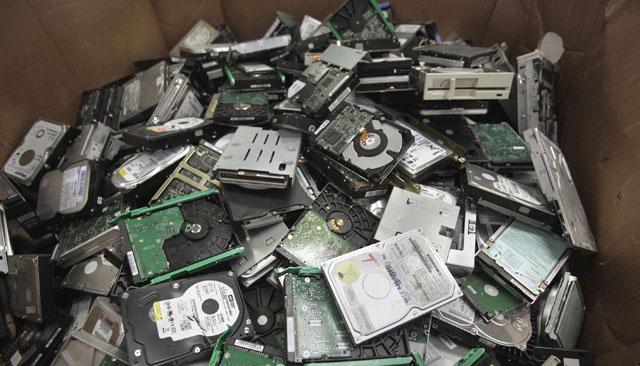You are here
Ministry distributes 200 bins for e-waste collection in governorates
By Hana Namrouqa - Mar 30,2015 - Last updated at Mar 30,2015
AMMAN — The Ministry of Environment has completed distributing the second batch of bins and containers across the country to collect electronic waste, a government official said Monday.
The ministry started earlier this month the distribution of 200 bins and containers in the governorates to collect unwanted computers, cellular phones, chargers, dry batteries and fluorescent light bulbs, Environment Minister Taher Shakhshir said.
“The ministry launched this project to improve waste management in the Kingdom, especially electronic and electric waste," the minister added in a statement.
The project’s first phase, implemented in cooperation with the UNDP and the UN Environment Programme, was launched in March last year, when the ministry distributed 200 bins with a capacity of 240 litres each for collecting computers, cell phones and dry batteries, while 40 wooden boxes were distributed for fluorescent light bulbs, which contain mercury.
Under the project’s second phase, the ministry will also organise lectures and campaigns on the dangers of storing electronic waste at home or disposing of them along with domestic waste, according to Shakhshir.
“The draft environment protection law, currently being examined at the Legislation and Opinion Bureau, features new articles that address electronic waste and seek to manage and regulate its collection and disposal,” the minister noted.
The bins were distributed at schools, universities, hospitals and municipality headquarters to facilitate access for the public.
The improper disposal or processing of electronic waste causes serious health and pollution problems, as some electronic scrap components contain contaminants such as lead, cadmium, beryllium, mercury and brominated flame retardants, according to web sources.
Environment Ministry officials believe that the absence of sound management of electronic waste threatens the environment and public health. Official figures indicate that 94 per cent of Jordanians own at least one cell phone and two-fifths of households own PCs, which are often discarded with regular garbage when outdated.
In Jordan, the average age of PCs ranges between two to five years, while it is eight to ten years for TV sets and fridges, and two to three years for most cell phones, according to ministry studies. Statistics indicate that at least one million Jordanian households are linked to the electricity network and thus each has a minimum of one electrical device.
Officials have repeatedly urged the public to drop off their unwanted or outdated computer equipment and any electronic waste at the ministry, which discards the materials at the hazardous waste unit in Swaqa Landfill, 160 kilometres from Amman.
Earlier this month, the Greater Amman Municipality distributed 88 containers to the headquarters of its 22 districts to enable residents to dispose of their unwanted electronic devices.
The containers are designated for the disposal of TVs and computer monitors, dry batteries, light bulbs and mobiles, according to the municipality.
Related Articles
The Ministry of Environment on Tuesday launched a campaign to collect electronic waste and guide the public on ways of handling it.
Starting next week, Amman residents can dispose of their unwanted electronic devices in containers designated for the collection of electronic waste, an official at the Greater Amman Municipality (GAM) said on Thursday.
The Ministry of Environment will launch a campaign within a week to raise public awareness on ways of handling electronic waste, according to officials.

















